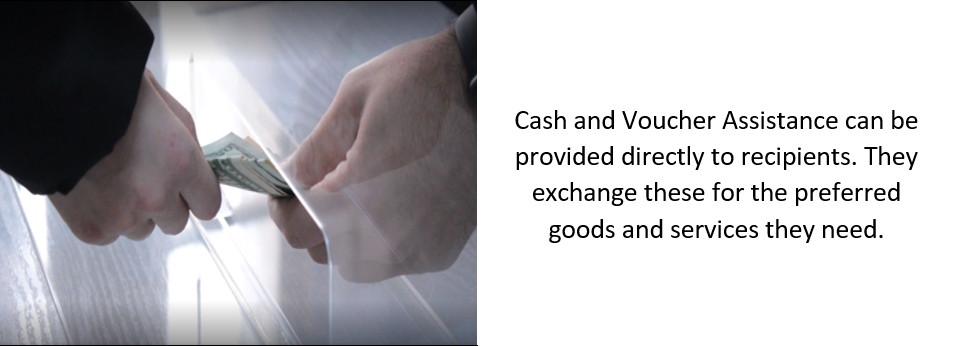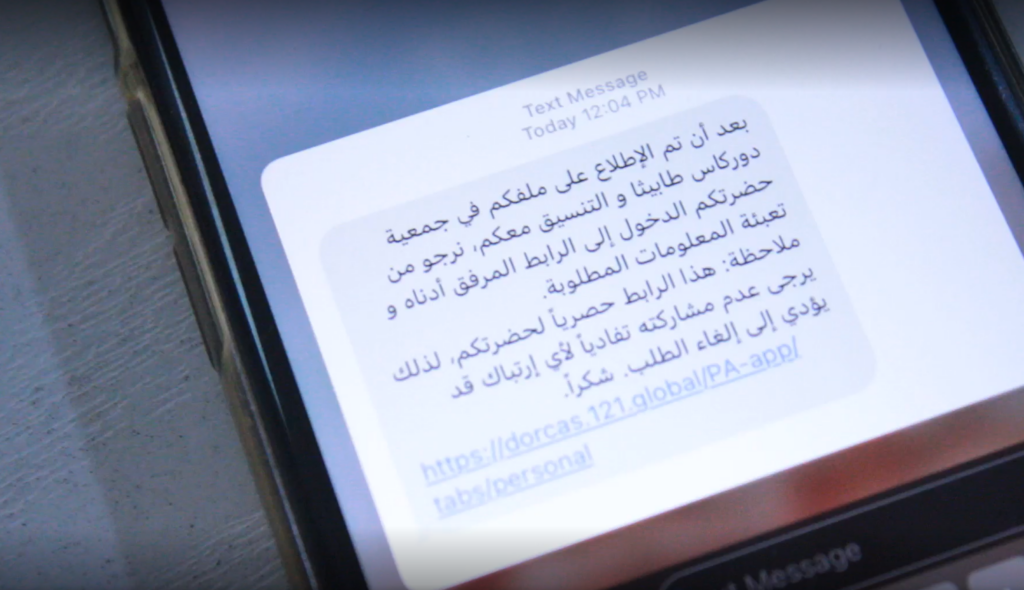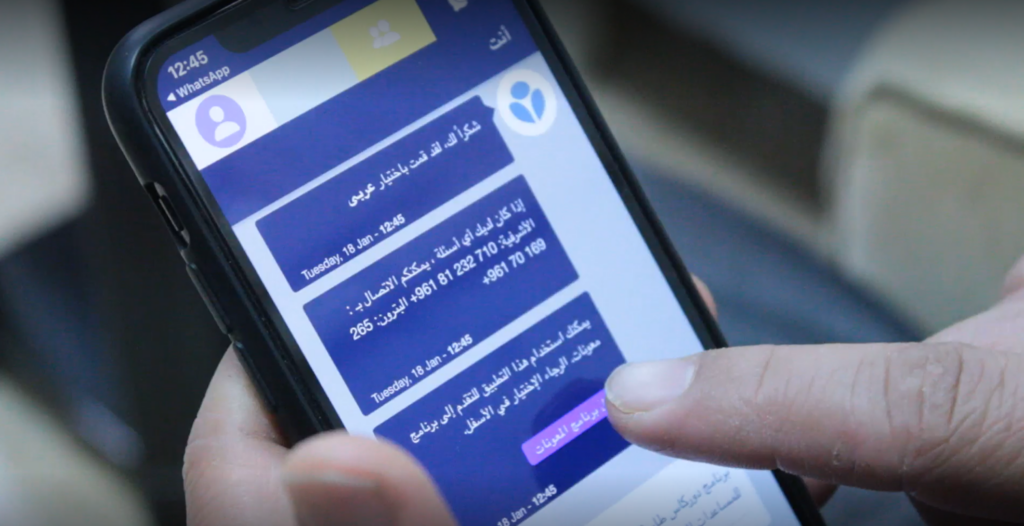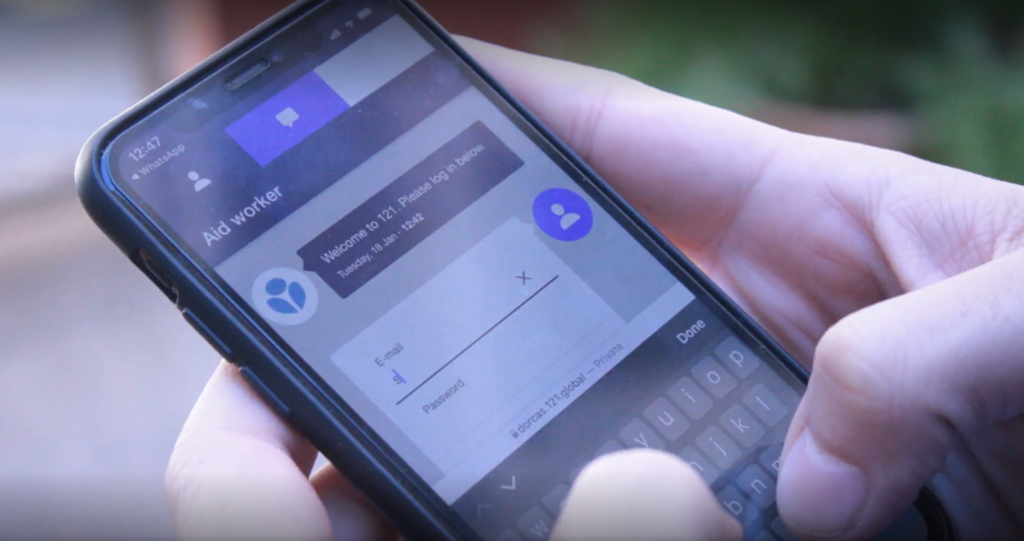Digitalising cash: using the 121 Platform to distribute cash in Beirut, Lebanon
People affected by crisis or exclusion have various needs depending on their personal situation. Cash and Voucher Assistance has become a key delivery modality for addressing humanitarian needs as it supports people’s independence and dignity to decide on their own needs. The 121 Platform offers a suitable solution for Cash and Voucher Assistance with a Humanitarian Organisation Portal, Aid Worker App and Person Affected App. It aims to make cash-based aid easier, safer and faster so that people affected by disasters can meet their own needs. Dorcas conducted a pilot of the 121 Platform in Beirut, Lebanon, where host communities, refugees and migrants were supported with cash.

Lebanon is home to the highest concentration of refugees per capita in the world. Almost half of Lebanese citizens live below the poverty line and many urgently need humanitarian assistance. Lebanon has struggled with a history of war. Furthermore, the 2020 Beirut explosion had a significant impact on the country, which reverberates to this day. The economic and political situation is worsening and a growing number of Lebanese are becoming dependent on aid.
The pilot in Beirut
Dorcas Lebanon started the 121 Platform Pilot in December 2021 for a period of 3 months. A total of 485 project participants (members of the host community, refugees and migrants) disaggregated by gender, participated in the project.
Within the pilot, the following steps were taken:
1. Registration
A group of participants was selected and received a text message about the project. Also, a link was shared so that people could register their request for assistance directly in the Person Affected App via a smartphone. People could do this themselves at their own convenience but if they needed help, they could go to one of the community centres where Dorcas staff members were available to assist with registration.

“I was worried that the registration process might be complex, but that was not the case. The questions were clear and specific. It was very easy and smooth to use!”
Male participant

“When you register yourself, you are not ashamed of the situation. Some things are hard to share with someone.”
Anonymous participant
Findings:
- Persons affected viewed self-registration as a more dignified and transparent process than registering directly with aid workers.
- 93 percent of participants experienced no problems in registering.
- 7 percent of them experienced certain issues, such as inability to use the technology or difficulty in understanding the questions.
Lessons learned:
- Register persons affected directly with aid workers if they struggle with literacy and/or digital access.
- Consider other modalities of registration when persons affected are not (sufficiently) familiar with using smartphones.
- Provide flexibility for people with disabilities and older people to appoint a family member to register on their behalf.
- Limit the amount of text in blocks between certain questions in the Person Affected App. This may help to avoid the person affected thinking they have completed the registration when they have not.
- Test registration questionnaires with a diversity of people for language simplicity, comprehensibility and feasibility of self-registration.
2. Validation
A total of 600 people registered. All registrations were reviewed and Dorcas Lebanon selected 485 project participants who were included in the project. A text message confirmed participation in the project towards the project participants. Other registered people received a text message informing them why they were not selected.
“With the Aid Worker App, validating has never been easier. When the registration was finalised, I immediately received a message with all of the applicant’s details. These can be viewed on a tablet or mobile phone and changes can be made when something is incorrect. And most importantly, the Aid Worker App works offline. Which makes it broadly usable in the field.”
Norma Nazarian (Social Worker and Case Manager at Dorcas Lebanon)

Findings:
- Using the Platform for selection and verification processes helped create confidence in the programme, supported a transparent selection process for the Cash and Voucher Assistance pilot and reduced conflict between community members about validation.
- Having an automated system of validation was perceived to remove potential personal bias.
- Verification and validation of registered persons affected by the Aid Worker App was especially appreciated.
- COVID-19 created new challenges on how to reach people affected and to provide inclusive, safe and quality Cash and Voucher Assistance without physical contact in communities. However, through the Person Affected App and self-registration, the 121 Platform enabled the remote registration of participants.
Lessons learned:
- Consider allowing two phone numbers to be linked to a registration.
3. Payment
The process of authorisation and payment of cash transfers can be handled and monitored online by designated responsible employees. The next step is to inform project participants regarding the payment via bulk messages. Relevant information, such as the amount of money they receive and where and when to collect this, is shared so that project participants can receive the cash.
Findings:
- Persons affected perceived cash distribution through financial services providers as easier, safer and faster than previous cash distribution by hand or through cash machines (ATMs).
Lessons learned:
- Coordinate with financial service providers to ensure the availability of cash in the right currency at all times at cash withdrawal points.
- Assist people with disabilities and older people with transportation to withdrawal points if this is needed.
Aid Worker App and HO-Portal
The solutions within the 121 Platform facilitated data gathering and communication between the project participants and Dorcas Lebanon. The use of the Aid Worker App and the HO-Portal is very easy and efficiently supports the work. It helped to store data securely and ensured the safety of all parties, especially considering the COVID-19 situation in Lebanon.
“Using the 121 Platform helped us to manage our cash project and provide cash support. When people register, their information is immediately included in the HO-Portal. From here you can send people notifications and make payments. Everything that is needed to provide the support is visible. The HO-Portal is fast, easy to use, safe and very reliable.”
Samer El Jamal (Project Officer at Dorcas Lebanon)
Overall experience
Given the generally positive experience in Dorcas Lebanon, we will investigate the possibility of further deploying the use of the 121 Platform within Dorcas in Lebanon and beyond. The 121 Platform is a suitable platform for managing Cash and Voucher Assistance programmes in the context of Lebanon. The simplicity of all stages in the process makes it an easy-to-use system. As contexts vary, we still need to ascertain whether 121 Platform is a suitable solution in new emergency relief settings. However, based on the experiences in Dorcas Lebanon, 121 Platform is definitely a suitable candidate for streamlining cash interventions.
“The 121 Platform is close to perfect. It is fast and the way it is connected to the Person Affected app is good. You cannot see all information, but you can see what you need. And it is user-friendly. Besides the advantages of the Person Affected App, Aid Worker App and HO-Portal, using the 121 Platform might also provide additional assurance to the donor that everything is well-tracked.”
Samer El Jamal (Project Officer at Dorcas Lebanon)
18 July 2022
Are you inspired?
Read the next story or contact us to get to know more about making an impact together.